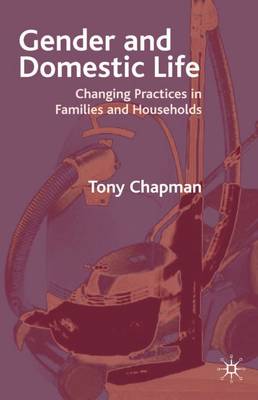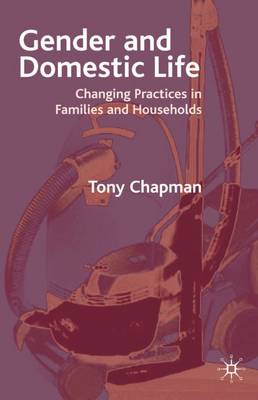
- Retrait gratuit dans votre magasin Club
- 7.000.000 titres dans notre catalogue
- Payer en toute sécurité
- Toujours un magasin près de chez vous
- Retrait gratuit dans votre magasin Club
- 7.000.0000 titres dans notre catalogue
- Payer en toute sécurité
- Toujours un magasin près de chez vous
Gender and Domestic Life
Changing Practices in Families and Households
Tony Chapman
Livre broché | Anglais
51,95 €
+ 103 points
Description
Tensions about men's and women's contribution to home life are often close to the surface in domestic relationships. As a result, when arguments erupt it is common for people to draw on culturally embedded stereotypes to explain or justify what men and women should or should not do.
Even in much of the sociological, feminist and men's studies literature, it is implicitly assumed that home life remains a woman's domain. As a consequence there has not, until now, been a wide-ranging analysis of gendered domestic practices available to students that critically compares men's and women's expectations and experiences fully. This book considers women's and men's domestic practices in a wide range of household types including: heterosexual couple, gay and lesbian, single people, older people, economic and cultural migrant, and communal households. It also explores the whole range of domestic practices including paid work, housework, childcare, leisure, managing and spending money and caring. The author argues that traditional gendered power relationships in the home are changing as women bring more economic resource into households and men express more interest in the project of domestic life. In doing so, the book explores the complex process of negotiation and compromise that occurs in all types of households as men and women attempt to match their expectations of what home life should be like, with the reality of everyday life. This thought-provoking book is ideal for anyone interested in debates concerning family life, gender and relationships, including students of Sociology, Gender Studies and Related Social Sciences.Spécifications
Parties prenantes
- Auteur(s) :
- Editeur:
Contenu
- Nombre de pages :
- 249
- Langue:
- Anglais
Caractéristiques
- EAN:
- 9780333924389
- Date de parution :
- 04-11-03
- Format:
- Livre broché
- Format numérique:
- Trade paperback (VS)
- Dimensions :
- 139 mm x 215 mm
- Poids :
- 331 g

Les avis
Nous publions uniquement les avis qui respectent les conditions requises. Consultez nos conditions pour les avis.






